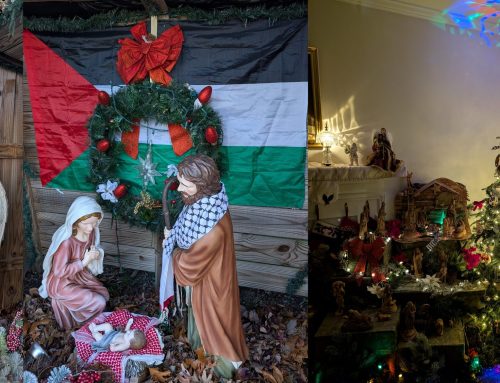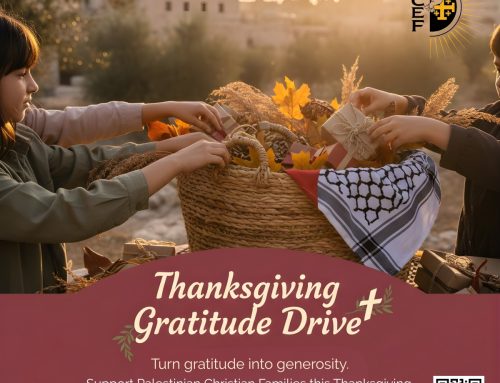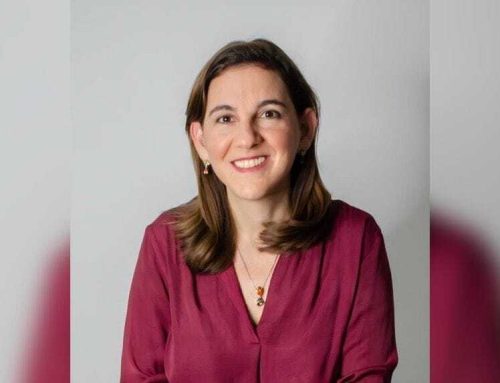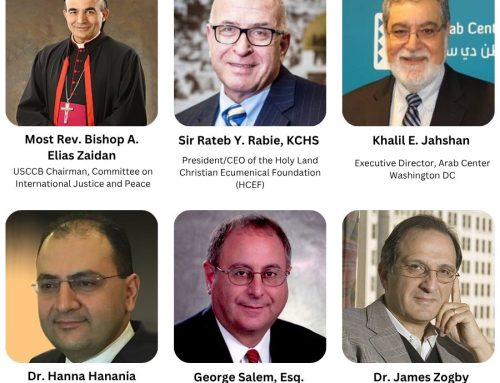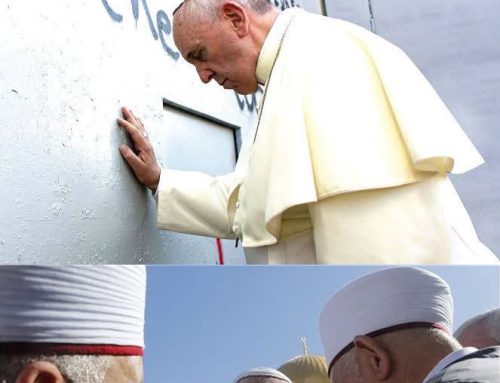Symposium Report by Carole Monica C. Burnett and Saliba Sarsar
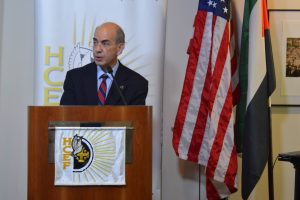 The Holy Land Christian Ecumenical Foundation (HCEF) held its International Symposium on Saturday, October 28, 2017 at the Jerusalem Fund for Education & Community Development. With the theme of “Jerusalem: The City of Peace for All,” the symposium was emceed by Dr. Saliba Sarsar (Chair, HCEF Research and Publication Committee, and Professor of Political Science, Monmouth University). It began with an opening prayer by Fr. James Gardiner, SA (Franciscan Friars of the Atonement, Franciscan Monastery of the Holy Land in Washington, DC).
The Holy Land Christian Ecumenical Foundation (HCEF) held its International Symposium on Saturday, October 28, 2017 at the Jerusalem Fund for Education & Community Development. With the theme of “Jerusalem: The City of Peace for All,” the symposium was emceed by Dr. Saliba Sarsar (Chair, HCEF Research and Publication Committee, and Professor of Political Science, Monmouth University). It began with an opening prayer by Fr. James Gardiner, SA (Franciscan Friars of the Atonement, Franciscan Monastery of the Holy Land in Washington, DC).
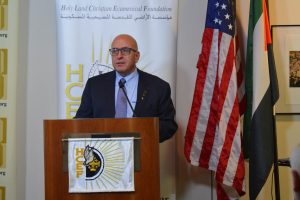 In his Welcome to the participants, Sir Rateb Rabie, KCHS (President/CEO of HCEF) remarked that the focus on Jerusalem is essential, especially East Jerusalem where the suffering of Palestinians there and the lack of support are huge. He also announced that next year the HCEF will celebrate its 20th anniversary.
In his Welcome to the participants, Sir Rateb Rabie, KCHS (President/CEO of HCEF) remarked that the focus on Jerusalem is essential, especially East Jerusalem where the suffering of Palestinians there and the lack of support are huge. He also announced that next year the HCEF will celebrate its 20th anniversary.
The Introduction by Prof. Saliba Sarsar included the information that Jerusalem was founded in approximately 3,000 B.C. and since then has been attacked 52 times, captured and recaptured 44 times, and destroyed two times. The city’s competing narratives, the analysis of its current situation, and the prospects for peace should be approached today with open hearts and minds, deep listening, and critical thinking.
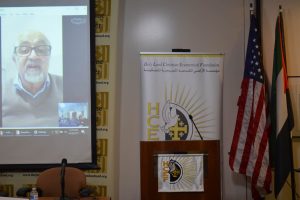 Session 1, “Jerusalem: A Status Report” was moderated by Sir Rateb. The first of two experts, Dr. Bernard Sabella (Executive Secretary of the Department of Service to Palestinian Refugees, or DSPR, of the Middle East Council of Churches), observed that Jerusalem is not one city, but two, with disparities and inequalities. Palestinians comprise 37% of the total population of the city; and Palestinian Christians are 1.4%. Poverty is widespread, with 76% of the residents of East Jerusalem, and 83.4% of its children, living below the poverty line. A serious problem is the effort by extremist religious Jews to alter the Status Quo on the Haram Al Sharif, which became evident last July. An important document is the 1994 Memorandum by the Heads of Churches in Jerusalem, which declares that Jerusalem should be an open city, universally accessible, and not monopolized by any particular group. Likewise, UN Resolution 242 specifies that East Jerusalem is occupied and subject to negotiations. Both of these statements are contradictions of the current Israeli position, which regards East and West Jerusalem together as a Jewish city. Click here to download the document of “Jerusalem: Demographic, Political and Religious Issues in Need of Answers”.
Session 1, “Jerusalem: A Status Report” was moderated by Sir Rateb. The first of two experts, Dr. Bernard Sabella (Executive Secretary of the Department of Service to Palestinian Refugees, or DSPR, of the Middle East Council of Churches), observed that Jerusalem is not one city, but two, with disparities and inequalities. Palestinians comprise 37% of the total population of the city; and Palestinian Christians are 1.4%. Poverty is widespread, with 76% of the residents of East Jerusalem, and 83.4% of its children, living below the poverty line. A serious problem is the effort by extremist religious Jews to alter the Status Quo on the Haram Al Sharif, which became evident last July. An important document is the 1994 Memorandum by the Heads of Churches in Jerusalem, which declares that Jerusalem should be an open city, universally accessible, and not monopolized by any particular group. Likewise, UN Resolution 242 specifies that East Jerusalem is occupied and subject to negotiations. Both of these statements are contradictions of the current Israeli position, which regards East and West Jerusalem together as a Jewish city. Click here to download the document of “Jerusalem: Demographic, Political and Religious Issues in Need of Answers”.
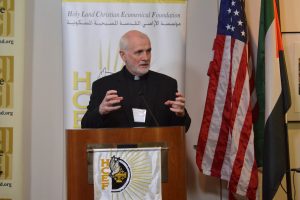 The second speaker, Fr. Michael McDonagh (Senior Advisor to the Apostolic Administrator of the Latin Patriarchate of Jerusalem and to the Archbishop of Jerusalem), emphasized the necessity to live humbly under God. The residents of the Holy Land, including the Church, must attain a keener awareness of their true vocation, which does not consist of technological advances or profits from exported products. He cited 2 Chronicles 7:14 (“if my people who are called by my name will humble themselves . . .”). The name Jerusalem means a city (or foundation or rainfall) of peace and wholeness. Israel should be asked whether it is striving for peace and wholeness. The Church must speak prophetically about the dehumanization of the other, housing discrimination, and the lack of democracy, among other problems, which reveal that the land of Israel is divorced from its Biblical vocation. Speaking prophetically is a challenge. Fr. McDonagh observed, “The truth will set you free, but first it will tick you off.”
The second speaker, Fr. Michael McDonagh (Senior Advisor to the Apostolic Administrator of the Latin Patriarchate of Jerusalem and to the Archbishop of Jerusalem), emphasized the necessity to live humbly under God. The residents of the Holy Land, including the Church, must attain a keener awareness of their true vocation, which does not consist of technological advances or profits from exported products. He cited 2 Chronicles 7:14 (“if my people who are called by my name will humble themselves . . .”). The name Jerusalem means a city (or foundation or rainfall) of peace and wholeness. Israel should be asked whether it is striving for peace and wholeness. The Church must speak prophetically about the dehumanization of the other, housing discrimination, and the lack of democracy, among other problems, which reveal that the land of Israel is divorced from its Biblical vocation. Speaking prophetically is a challenge. Fr. McDonagh observed, “The truth will set you free, but first it will tick you off.”
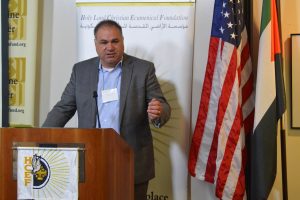 Session 2, “What Jerusalem Means to Us—Christian Perspectives and Reflections” was moderated by Mr. Elias G. Saboura, Esq. (HCEF Board Member and Saboura Law Group, P.C.). A native son of Jerusalem, he connected the Holy City with religious sites, but also with walls – and not only with walls, but with gates in the walls. It is a city of war and peace, of stones and living stones.
Session 2, “What Jerusalem Means to Us—Christian Perspectives and Reflections” was moderated by Mr. Elias G. Saboura, Esq. (HCEF Board Member and Saboura Law Group, P.C.). A native son of Jerusalem, he connected the Holy City with religious sites, but also with walls – and not only with walls, but with gates in the walls. It is a city of war and peace, of stones and living stones.
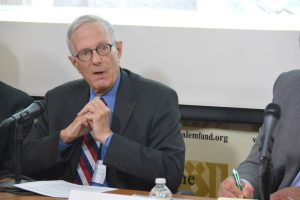 The first speaker, Ambassador David Mack (retired; currently a Scholar of the Middle East Institute and an Elder of the National Presbyterian Church, Washington, D.C.) was a Fulbright Scholar in Cairo and represented the U.S. State Department in Amman, Jordan, as well as in Jerusalem. His fondest memory of Jerusalem is his wedding in St. George’s Anglican Cathedral. The story of the events leading up to the wedding both enthralled and amused the conference participants. The political aspect of his experiences in Jerusalem arose from his assignment there after the 1967 war. He was tasked with opening a U.S. visa office on Nablus Road in East Jerusalem. Both the staff and the clientele of this office were diverse and well integrated. One of his employees was a Middle Eastern Jewish woman who, being bi-cultural, spoke Arabic with the Palestinians and Hebrew with the Israelis in the office. Such integration shows that Israelis and Palestinians can get along if they have a common goal.
The first speaker, Ambassador David Mack (retired; currently a Scholar of the Middle East Institute and an Elder of the National Presbyterian Church, Washington, D.C.) was a Fulbright Scholar in Cairo and represented the U.S. State Department in Amman, Jordan, as well as in Jerusalem. His fondest memory of Jerusalem is his wedding in St. George’s Anglican Cathedral. The story of the events leading up to the wedding both enthralled and amused the conference participants. The political aspect of his experiences in Jerusalem arose from his assignment there after the 1967 war. He was tasked with opening a U.S. visa office on Nablus Road in East Jerusalem. Both the staff and the clientele of this office were diverse and well integrated. One of his employees was a Middle Eastern Jewish woman who, being bi-cultural, spoke Arabic with the Palestinians and Hebrew with the Israelis in the office. Such integration shows that Israelis and Palestinians can get along if they have a common goal.
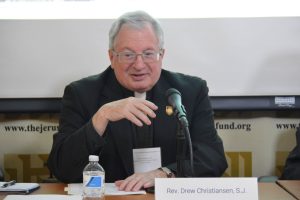 Fr. Dr. Drew Christiansen, S.J. (co-founder of HCEF and Distinguished Professor of Ethics and Global Development at Georgetown University’s School of Foreign Service), explained the position on Jerusalem that was held by Pope Saint John Paul II, who regarded Jerusalem as the locus of divine-human encounter and the place where the human family comes together. Pope Saint John Paul II traveled to Jerusalem for the Jubilee Year and, despite being afflicted by Parkinson’s Disease, he planted three olive trees. He was keeping alive the vision of Isaiah 56 (“house of prayer for all peoples”). Fr. Christiansen stated that in the Catholic view the nature of Jerusalem is to uphold full human rights for all people. Religious rights are not confined only to the access to the Holy Places, but include the practice of religion and the preservation of religious heritage for all people. A shared goal that can bring the three religions together is environmental concern, including the restoration and preservation of the Biblical landscape.
Fr. Dr. Drew Christiansen, S.J. (co-founder of HCEF and Distinguished Professor of Ethics and Global Development at Georgetown University’s School of Foreign Service), explained the position on Jerusalem that was held by Pope Saint John Paul II, who regarded Jerusalem as the locus of divine-human encounter and the place where the human family comes together. Pope Saint John Paul II traveled to Jerusalem for the Jubilee Year and, despite being afflicted by Parkinson’s Disease, he planted three olive trees. He was keeping alive the vision of Isaiah 56 (“house of prayer for all peoples”). Fr. Christiansen stated that in the Catholic view the nature of Jerusalem is to uphold full human rights for all people. Religious rights are not confined only to the access to the Holy Places, but include the practice of religion and the preservation of religious heritage for all people. A shared goal that can bring the three religions together is environmental concern, including the restoration and preservation of the Biblical landscape.
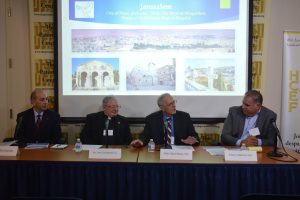 For Prof. Saliba Sarsar, Jerusalem is the city where he was born and grew to adulthood. In childhood his sense of identity was confined to Christianity, but as he matured, he became aware of the sacredness of Jerusalem to other faiths; thus the meaning of Jerusalem was expanded to include all of humanity. Prof. Sarsar does not entertain thoughts of Jerusalem without thinking of the three faiths for which Jerusalem is a home. Jerusalem, the place where earth seems nearer to heaven, must be inclusive. It must be characterized by respect for the dignity of the other and concern for the welfare of the other. Jesus stated that the two great commandments are love of God and love of neighbor. Therefore, we must push the message that Jerusalem is a city for all.
For Prof. Saliba Sarsar, Jerusalem is the city where he was born and grew to adulthood. In childhood his sense of identity was confined to Christianity, but as he matured, he became aware of the sacredness of Jerusalem to other faiths; thus the meaning of Jerusalem was expanded to include all of humanity. Prof. Sarsar does not entertain thoughts of Jerusalem without thinking of the three faiths for which Jerusalem is a home. Jerusalem, the place where earth seems nearer to heaven, must be inclusive. It must be characterized by respect for the dignity of the other and concern for the welfare of the other. Jesus stated that the two great commandments are love of God and love of neighbor. Therefore, we must push the message that Jerusalem is a city for all.
Prof. Sarsar also spoke of a special book, “What Jerusalem Means to US: Christian Perspectives and Reflections,” that will published under the auspices of HCEF in spring 2018. Leaders – religious, academic, organizational, media – belonging to different Christian denominations and originating from different corners of the earth, will share their views on Jerusalem.
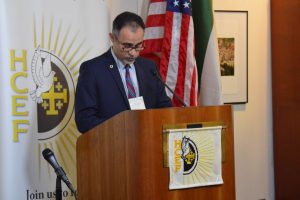 Session 3, New Strategies for East Jerusalem: Palestinian Economy, Religious Tourism, and Developmental Projects, was moderated by Mr. Marwan Ahmad (President, The Arab American Business Council). He observed that religious tourism is an under-exploited contributor to the Palestinian Gross Domestic Product. There was a temporary decline in religious tourism from late 2015 until mid-2016 because of incidents of violence, but there has been resurgence for more than a year now. Obstacles to the development of religious tourism are posed by Israel, with its policies on overnight stays in the West Bank and its treatment of new arrivals at Ben Gurion Airport. Israel controls the airspace.
Session 3, New Strategies for East Jerusalem: Palestinian Economy, Religious Tourism, and Developmental Projects, was moderated by Mr. Marwan Ahmad (President, The Arab American Business Council). He observed that religious tourism is an under-exploited contributor to the Palestinian Gross Domestic Product. There was a temporary decline in religious tourism from late 2015 until mid-2016 because of incidents of violence, but there has been resurgence for more than a year now. Obstacles to the development of religious tourism are posed by Israel, with its policies on overnight stays in the West Bank and its treatment of new arrivals at Ben Gurion Airport. Israel controls the airspace.
The speaker, Sir Rateb Rabie, KCHS, remarked that tourism is the main industry of Jerusalem. The HCEF’s “Living Stones” pilgrimages are free from propagandizing, but people are on fire when they return home. Sir Rateb’s PowerPoint presentation listed key points under various topics, as follows.
Israeli policy toward Jerusalem can be characterized by three principal factors: 1. De-development (withholding services from East Jerusalem, although East Jerusalemites pay the same taxes as Israelis; in the Old City, 81.8% of Palestinians are below the poverty line, as contrasted with 28.4% of Jewish residents); 2. Integration (the Israelization of East Jerusalem, undermining the Palestinian identity, for example, by removing Arabic from the street signs); and 3.Gentrification (settlers moving into the city, displacing Palestinians, especially in the Old City; also Israeli tourist maps highlighting Jewish landmarks, but omitting Palestinian sites).
The Separation Wall and checkpoints have decreased mobility for Palestinians and have fragmented Palestinian society. The high level of Palestinian Christian emigration is not due to relationships with Muslims – contrary to what some Americans think. But Palestinian Christians are vital because the West will listen to them and therefore they can open doors for all Palestinians. Israelis are capitalizing on Muslim tourism by attracting and hosting Muslim tourists from around the world, but Palestinian Christians are also hospitable to Muslim groups.
Mr. Ahmad supported Sir Rateb’s point by remarking that there is a huge potential in Islamic tourism. Services are needed for Muslim religious tourists. Sir Rateb noted that there is a current decline in the number of hotels, room capacity, tourist services, and Tourism bus transport. He explained that strategies for tourism include: 1. Protection of Palestinian culture and heritage and of existing establishments with their capacities (e.g., the Bethlehem Museum was established as an attraction for tourists); 2. Competitive capacity (challenging seasonality; involving the larger community in tourism packages; mobilizing various sectors of society, including women and youth; holding arts and crafts exhibits and cultural festivals); and 3. Promotion (putting East Jerusalem on regional and international tourist maps; networking with local, regional, and international organizations; establishing Palestinian tourism centers in major cities worldwide; engaging local churches and mosques; working with Islamic centers in Jerusalem and around the world; getting endorsements from churches and their clergy).
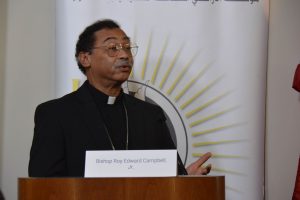 Following lunch, Bishop Roy Edward Campbell, Jr. (Auxiliary Bishop, Archdiocese of Washington) delivered an inspirational reflection. He stated that what Jerusalem means to Christians is that we love God by the way in which we love one another, as Jesus taught. Jesus never spurned anyone because of their circumstances, never placed anyone above anyone else. We should look for the New Jerusalem, where everyone has equal dignity; this includes honoring the just claims to the city of the three major faiths. In Jerusalem, God lived as one of us. In Jesus, God showed us an example of how we should live. Jesus’s message of unity is one that we must spread, remembering that it stems from this location in the Middle East.
Following lunch, Bishop Roy Edward Campbell, Jr. (Auxiliary Bishop, Archdiocese of Washington) delivered an inspirational reflection. He stated that what Jerusalem means to Christians is that we love God by the way in which we love one another, as Jesus taught. Jesus never spurned anyone because of their circumstances, never placed anyone above anyone else. We should look for the New Jerusalem, where everyone has equal dignity; this includes honoring the just claims to the city of the three major faiths. In Jerusalem, God lived as one of us. In Jesus, God showed us an example of how we should live. Jesus’s message of unity is one that we must spread, remembering that it stems from this location in the Middle East.
Session 5, introduced by HCEF volunteer Mae Nazar Kafati, consisted of showing the documentary, “Judhuri” (“My Roots”) by Loubna Turjuman, a Palestinian Guatemalan, who visited and lived Palestine with the “Know Thy Heritage” Leadership Program. Her primary goal in making the documentary was to honor her Palestinian father who was born and raised in Jerusalem. The documentary recorded the journey of discovery that has delighted and enlightened young travelers. Two of the striking personal encounters in this film included a conversation with an Israeli soldier at the Western Wall, who was an American from Boca Raton, Florida, as well as a conversation with little Palestinian boys on a city street who were proud of their soccer ball and eager to express their admiration for internationally famous soccer players.
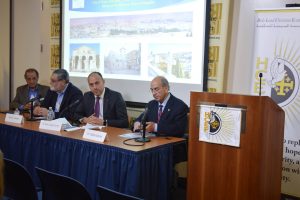 Session 6, Israel-Palestine, Jerusalem, and the Prospects of Peace: Regional and International Influences, was moderated by Prof. Saliba Sarsar. He expressed his doubt about the prospects for peace in the near future and his wish for greater clarity and consistency in U.S. foreign policy.
Session 6, Israel-Palestine, Jerusalem, and the Prospects of Peace: Regional and International Influences, was moderated by Prof. Saliba Sarsar. He expressed his doubt about the prospects for peace in the near future and his wish for greater clarity and consistency in U.S. foreign policy.
The first speaker, HE Ambassador Husam Zomlot (Head, PLO General Delegation in the United States), prefers the word “exile” rather than the term “diaspora” to refer to the situation of Palestinians who have emigrated. He agreed with Bishop Campbell that Jerusalem is the city of God and of peace for all. For Palestinians, Jerusalem functions in these ways: 1. Jerusalem is sacred for three religions. There should be no monopoly. 2. Jerusalem is a national hub, or center of gravity. Cultural events and major hospitals are there. 3. Jerusalem is a political hub. Palestinians own it. What is now West Jerusalem was previously a number of Arab neighborhoods and villages such as Qatamon. The Palestinians’ call for Jerusalem to be the capital of Palestine is not a demand, but a concession.
According to Ambassador Zomlot, Israeli policy has three legs: 1. Deconstruction of Palestinian society by declaring Palestinian Jerusalemites to be aliens with temporary residency in their own city, and by attacking the Palestinian leadership and cultural institutions, for example, shutting down Orient House; and weakening Palestinian society by means of economic deprivation (such as not collecting garbage and encouraging the drug trade). 2. Colonization focusing on replacing the Palestinian people, calling it “diversity.” 3. Israelization of the Palestinian people, for example, by teaching the Israeli narrative to Palestinian schoolchildren. The Palestinian people have four defenses: 1. Firmness of the people (e.g., the street protests outside the Haram Al Sharif in July 2017). 2. Jerusalem as a central focus for Palestinian people everywhere, throughout Palestine and the whole world. 3. Support in the region of the Middle East (Jerusalem is important to everyone in the region). 4. The international community (especially UN Resolution 2334 on settlements). The stumbling-block of all negotiations has been Jerusalem. There will be no final agreement without East Jerusalem being designated as the Palestinian capital. This capital city will be open to all faiths, including Jews.
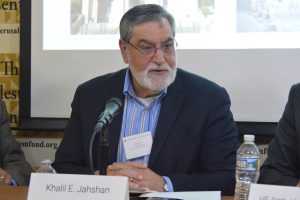 The second speaker, Mr. Khalil E. Jahshan (Executive Director, Arab Center Washington D.C. Inc.), noted that the Israeli occupation, now 50 years old, was originally portrayed by the Israelis as a temporary measure. Occupation is bad for Israelis, Palestinians, and the United States. The Palestinians are suffering the dehumanization and disintegration of the Palestinian people, as well as colonization. Peacemaking efforts at this time are naïve and disregard the facts on the ground. In an interview with Haaretz, published on March 21, 2017, a former Mossad chief said that Israel has chosen not to choose, thus putting its head in the sand. There is plenty of blame: on Israel for its intransigence and appetite for other people’s land; on Palestine for its political weakness and lack of will to achieve an end of the occupation; on the Arab world for its decline of interest in Palestine; on the international community; and on the U.S., which has been part of the problem.
The second speaker, Mr. Khalil E. Jahshan (Executive Director, Arab Center Washington D.C. Inc.), noted that the Israeli occupation, now 50 years old, was originally portrayed by the Israelis as a temporary measure. Occupation is bad for Israelis, Palestinians, and the United States. The Palestinians are suffering the dehumanization and disintegration of the Palestinian people, as well as colonization. Peacemaking efforts at this time are naïve and disregard the facts on the ground. In an interview with Haaretz, published on March 21, 2017, a former Mossad chief said that Israel has chosen not to choose, thus putting its head in the sand. There is plenty of blame: on Israel for its intransigence and appetite for other people’s land; on Palestine for its political weakness and lack of will to achieve an end of the occupation; on the Arab world for its decline of interest in Palestine; on the international community; and on the U.S., which has been part of the problem.
According to Mr. Jahshan, since 1937, there have been 79 attempts at peacemaking. At this time, the Trump administration is not favoring two states. It whines about settlements, but does not call for a settlement freeze; indeed, the U.S. Ambassador, Mr. Friedman, is a supporter of settlements. The Trump administration does not know the history of the issues. Its policies are vague. For Mr. Jahshan, “We know what it will take to achieve an agreement, but does the political will or the moral will exist?” The bottom line: “There will be no peace in the Middle East without Palestine, and there is no Palestine without Jerusalem.”
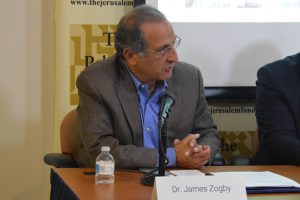 The third speaker, Dr. James Zogby (President, Arab American Institute), agreed with Ambassador Zomlot that Jerusalem is the hub for Palestinians. In Ramallah, the property values and congestion are due to being cut off from the hub. Palestinian Christians have had a long presence in the Holy Land, but there is ignorance about it. When the United States pursues the issue of religious freedom abroad, it ignores the Palestinian Christians. Israel makes non-Jews into second-class people or non-people. The two-state solution is not possible, either physically or politically. When Israelis say that they support the two-state solution, they are merely trying to get Europeans off their back. The Israeli government is not able to construct a political coalition that can make peace; that is, they cannot procure 61 members. Recent surveys indicate that approximately 40% of Palestinians say that peace is not possible, and approximately 60% of Palestinians want Palestinian unity, but approximately 70% say that this is not possible.
The third speaker, Dr. James Zogby (President, Arab American Institute), agreed with Ambassador Zomlot that Jerusalem is the hub for Palestinians. In Ramallah, the property values and congestion are due to being cut off from the hub. Palestinian Christians have had a long presence in the Holy Land, but there is ignorance about it. When the United States pursues the issue of religious freedom abroad, it ignores the Palestinian Christians. Israel makes non-Jews into second-class people or non-people. The two-state solution is not possible, either physically or politically. When Israelis say that they support the two-state solution, they are merely trying to get Europeans off their back. The Israeli government is not able to construct a political coalition that can make peace; that is, they cannot procure 61 members. Recent surveys indicate that approximately 40% of Palestinians say that peace is not possible, and approximately 60% of Palestinians want Palestinian unity, but approximately 70% say that this is not possible.
According to Dr. Zogby, Hamas is an abject failure, and the Palestinian Authority is the largest source of jobs in Palestine. Therefore, the PA must be careful because people need to keep their government jobs. (The other major source of income for Palestinians is jobs inside Israel.) Israel has become pathological – a spoiled brat. Bad behavior is now the norm. However, Israel does not suffer any bad consequences, no matter how bad its behavior is. Palestine does not receive any rewards, no matter how good its behavior is. The U.S. does not perceive Palestinians as human beings, partly because the movie Exodus was such a stunning success. We must focus on individual Palestinians who are suffering from human rights abuses, in order to put a human face on the situation.
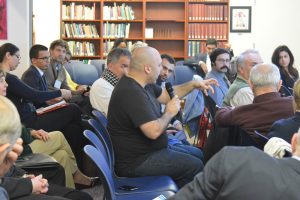 The ensuing conversation between the panelists and the audience focused on how to change public opinion in the U.S. Mr. Jahshan believes that organized leadership on college and university campuses is important. Each campus component should be part of a larger national movement. Ambassador Zomlot believes that Palestinians must do re-branding, show Americans that their society has always been highly educated (with close to zero percent illiteracy) and tolerant of diversity, and make clear that they are not merely victims but are professionals. Palestinians need an agency in the U.S., alliances with solidarity groups in the U.S., and investment in the youth. U.S. legislators know that Palestinians are suffering, but they are concerned about votes, money, and their own power; therefore, it is important to look at the constituencies of the Congressional legislators. Dr. Zogby believes that the human face is the crucial factor. The movement toward gay marriage succeeded because everyone knew someone who was gay. By contrast, there has been no success in eliminating homelessness because most people do not know personally any homeless person. Hence, Americans need to meet and get to know individual Palestinians.
The ensuing conversation between the panelists and the audience focused on how to change public opinion in the U.S. Mr. Jahshan believes that organized leadership on college and university campuses is important. Each campus component should be part of a larger national movement. Ambassador Zomlot believes that Palestinians must do re-branding, show Americans that their society has always been highly educated (with close to zero percent illiteracy) and tolerant of diversity, and make clear that they are not merely victims but are professionals. Palestinians need an agency in the U.S., alliances with solidarity groups in the U.S., and investment in the youth. U.S. legislators know that Palestinians are suffering, but they are concerned about votes, money, and their own power; therefore, it is important to look at the constituencies of the Congressional legislators. Dr. Zogby believes that the human face is the crucial factor. The movement toward gay marriage succeeded because everyone knew someone who was gay. By contrast, there has been no success in eliminating homelessness because most people do not know personally any homeless person. Hence, Americans need to meet and get to know individual Palestinians.
The symposium closed following a prayer for peace by Fr. Michael McDonagh.

